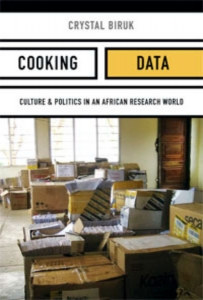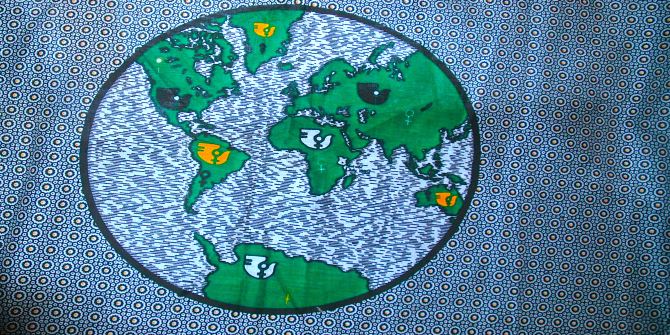In Cooking Data: Culture and Politics in an African Research World, Crystal Biruk offers an analysis of the production of data within HIV-AIDS quantitative survey research conducted in Malawi. This insightful book deepens our understanding of the racial, neo-colonial and urban-rural assymetries that can be effected in the pursuit of methodologically rigorous data, finds Anna Wolkenhauer, and raises key questions for critical anthropologists to consider in their own work.
Cooking Data: Culture and Politics in an African Research World. Crystal Biruk. Duke University Press. 2018.
 Find this book (affiliate link):
Find this book (affiliate link): ![]()
In Cooking Data: Culture and Politics in an African Research World, Crystal Biruk analyses the production of data within HIV/AIDS survey research conducted in Malawi. Their book is a brilliant example of an ethnography of global health that brings to light in a carefully written manner the various boundaries that are manifested in western-led and ‘locally’-implemented projects aimed at generating ‘evidence’ for policymaking. Biruk deepens our understanding of the racial, neo-colonial and urban-rural asymmetries that are effected in an effort to produce methodologically rigorous data. This is particularly relevant as ‘evidence-based policy-making’ has become a legitimacy claim for national policymakers as well as international organisations. Biruk’s study is not only a critique of the most common type of research projects currently conducted in and on Southern Africa – quantitative surveys – but raises many wider questions upon which critical anthropologists should reflect.
Biruk conducted ‘research on research’ (what colleagues in the field named ‘ROR’) during two long stays in Malawi between 2005 and 2008. In keeping with global ethnography approaches, Biruk did not spend their time in the prototypical village for the entire period, but rather followed different HIV/AIDS surveys that were led by American researchers in collaboration with Malawian co-researchers and field workers.
The main impact of Biruk’s book is in laying bare the manifold processes of producing and ‘cooking’ data – from the initial survey design to data collection in villages to dissemination meetings in policy circles. The book’s title takes up Claude Lévi-Strauss’s binary of ‘raw’ and ‘cooked’, where the former represents nature and the latter human production (4). Its chapters follow the life course of the data and concentrate on the relationships and realities which are created in the process. Rather than suggesting that anthropology would be superior to survey research or claiming the latter’s uselessness, Biruk aims to ‘show what kinds of worlds come about through numbers, raw, cooked, or otherwise’ (201). The worlds Biruk describes exhibit several dimensions of power asymmetries, each of which would justify a book length study but produce an even more interesting picture when analysed in conjunction. The author shows convincingly and in an empirically well-founded manner how these dimensions intersect and how they all relate to an overriding methodological critique.
Image Credit: ‘IMG_0384’ by Slum Dwellers International licensed under CC BY 2.0
One of the boundaries that Biruk investigates is constructed early on in the cooking process: between the research offices and the field. Even in the design phase of the survey, the image of the field that informs the questions is that of a messy, unpredictable and exotic space that is ‘situated far beneath the space of calculation, intellect, and analysis’ (37). Surveys need to be designed in a way that translates the actual interests of the researcher into categories and languages to which people in villages will be able to refer. There is a hierarchy of intellect which is situated in a neo-colonial space and has a racial dimension, too. Biruk, for instance, describes how survey researchers working in Africa often prefer visual ways of communicating scales, as they are supposedly easy to understand (53-55). Biruk also gives an example of the Longitudinal Study of AIDS in Malawi (LSAM) that envisioned interviewees expressing probabilities with the help of beans, imagining that this was an intuitive and easy-to-grasp tool. The field workers conducting the questionnaire, however, often faced respondents who found this exercise absurd, unnecessarily time-consuming and infantilising (138-40).
While there is a marked hierarchy between the office and the field, field workers – i.e. young Malawians who are temporarily hired for data collection – are situated in between. They are seen as intellectually capable of receiving briefings from lead researchers, but also speak the field language and are imagined as being culturally closer to the targeted respondents. Their adaption and translation work is, in fact, key for the survey to be successful, as their ‘local’ expertise is sought in a final review of the questionnaires before they are taken to the villages (although outside researchers often overestimate the level of local knowledge their data collectors possess). Yet, their status remains clearly below the more intellectual task of number-crunching and theorising. At the same time, the Malawian students and young graduates make an effort to distance themselves from the village populations they interview, joining in with US researchers in constructing a backward image of rural Malawi. This exhibits and manifests the urban-rural and class asymmetries within Malawian society.
Certain habits help to uphold the boundary between the people in the village and the researchers in the office. Biruk discusses at length the social meanings inherent in the tradition of handing respondents a piece of soap in exchange for their information. This well-intended and much-debated compensation shows striking parallels to colonial hygiene education and rests on a presumption of a rural gift society, running contrary to the monetary compensation field workers receive for their work (which, however, is of course minimal compared to the principal investigator’s consultancy pay).
So how are all these asymmetries intrinsically linked to quantitative survey research design? In my view, Biruk does not exploit the wealth of their material as much as they could have with regards to this cross-cutting question. This may be due to their self-reflexivity as a researcher, and their acknowledgement of the fact that anthropologists also engage in the same kind of ‘performance’ when interviewing villagers in Malawi (127). Yet, I would argue that a lot of the problematic social effects Biruk describes are inherently due to the methodological assumptions and methodical procedures of survey research.
Firstly, for quantitative survey research, statistical expertise is needed to calculate correlations. This is not possessed by many people in countries with relatively weak education systems and few funds for graduate studies. Sound methods skills are a key criterion in the hiring process of consultants to lead research projects and these often come from North American universities. This asymmetry is related to the differential status that is given to different types of knowledge, which also translates into unequal remunerations and career implications. Outside economists head this hierarchy, followed by Malawian supervisors, field workers and, lastly, the village population. Methodological schools that attribute greater importance to alternative types of knowledge would be better suited to overcome this widely spread and racialised hierarchy of intellect.
Secondly, quantitative survey research is built on a strong deductive approach. The ideal interview question does not allow a respondent to give an answer that has not been foreseen – what Biruk calls a ‘fetish for codes’ (60) – and is hence of limited ability to discover anything new. In this way, cultural, racial and neo-colonial stereotypes are reproduced repeatedly, as Biruk illustrates with an example from HIV/AIDS research in Malawi. There, the belief that traditional cultural habits are the main reason for the spread of HIV/AIDS persisted because it resonated with general assumptions, despite the lack of evidence for this claim (181-85).
In sum, Biruk offers a very insightful, convincingly argued and well-substantiated account of the effects of what has become the most common type of research not only in global health but the development industry more generally. The questions the book raises are important for any type of researcher who works in a post-colonial context. And yet, the critique Biruk voices is particularly acute for quantitative survey research. Here, what counts are number-crunching skills and the ability to quickly produce easily digestible data, rather than a willingness to be surprised and to invest time in the relational side of data generation – including the question of how to preserve the dignity of respondents – throughout the entire data cooking process.
Note: This review gives the views of the author, and not the position of the LSE Review of Books blog, or of the London School of Economics. The LSE RB blog may receive a small commission if you choose to make a purchase through the above Amazon affiliate link. This is entirely independent of the coverage of the book on LSE Review of Books.








